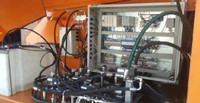Raspberry Pi and Arduino are very well-known equipment for fast electronic molding and home-made DIY applications. They have the advantages of programmatic flexibility, customizable signal types and ease of adaptation to existing equipment, bringing many benefits to the industrial sector. They have become a substitute for common industrial equipment, low cost and flexible, adding remote control and monitor for small traditional industrial systems.
The three most common problems with the use of such development boards in industrial environments:
Robustness in Industrial Environment
There are already a number of Arduino and Raspberry Pi enhanced versions available on the market. Industrial devices such as Industrial Shields' Arduino-based and raspberry-based tablet PCs have included additional robustness to meet industrial requirements. In addition, a variety of shells with different industrial standard are specially developed to adapt to these two boards.
Safety
Is hardware based on Raspberry Pi and Arduino a solution for industrial applications safety? This is probably the most controversial topic on the internet. The question does not have a simple answer, and it depends on many factors. The safety of industrial applications depends not only on the PLC, but also on the integrity of the entire project, how the system and software are implemented, and how security is considered in the project design. This is an interesting debate between engineers, from a different perspective on security issues.
Industry Standard Information Protocol
This is the origin of Arduino and Raspberry Pi. On the basis of the Modbus protocol, a specific library was developed so that the two boards could communicate with each other via their protocols.
Modbus is a serial communication protocol developed by Modicon for its programmable logic controller (PLC). It has been the most common communication protocol and can be applied by many automation vendors such as Omron, Opto 22, Schneider and Mitsubishi.
The main reasons for the widespread use of Modbus in industrial environments include industrial application development, free development, ease of use, installation and maintenance, and minimal restrictions on suppliers.
Modbus allows multiple different devices to connect to the same network common communication, no matter what OEMs they are. The demand for communication between different devices from different vendors has become more important than the arrival of the fourth industrial revolution. Industrial 4.0 and Industrial IoT have given Modbus the second life.
As long as the project is specially designed to ensure safety, the enhanced versions of Arduino and Raspberry Pi can be valuable and reliable, to replace mature industrial equipment especially small traditional industrial systems connected to the network.
RS Components New Raspberry Pi 3 Model B
RS Components now offers the latest members of the Pi family - the new Raspberry Pi 3 Model B. The new motherboard is ideal for program learning, playing games and programming, which is also the perfect choice for IoT project applications!
RS Components supply Raspberry Pi 3 Starter Kit
Recently launched in the global Raspberry Pi 3 Starter Kit is special for new users and entry-level users, including eight components - Raspberry Pi 3 Model B motherboard, shell, pre-installed software micro-SD card, USB keyboard and mouse, international standard power supply, HDMI 2.0 cable, andAdventures in Raspberry Pi that isa book can inspire users to design and build their own inventions and innovations. The kit also provides customers with all the connectors and peripherals needed to get started quickly.


 My Message
My Message
 Suggestions
Suggestions













Cleveland
2017/2/26 18:20:50
A great sharing for beginners. Thanks for your efforts and I will follow you and keep reading your posts.